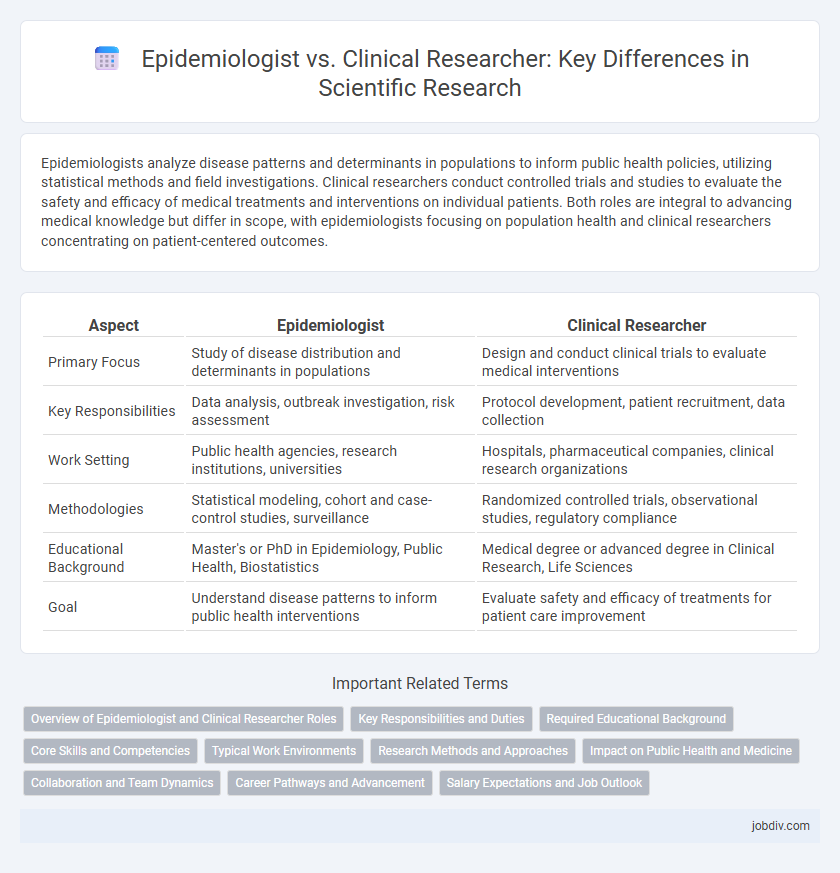Epidemiologists analyze disease patterns and determinants in populations to inform public health policies, utilizing statistical methods and field investigations. Clinical researchers conduct controlled trials and studies to evaluate the safety and efficacy of medical treatments and interventions on individual patients. Both roles are integral to advancing medical knowledge but differ in scope, with epidemiologists focusing on population health and clinical researchers concentrating on patient-centered outcomes.
Table of Comparison
| Aspect | Epidemiologist | Clinical Researcher |
|---|---|---|
| Primary Focus | Study of disease distribution and determinants in populations | Design and conduct clinical trials to evaluate medical interventions |
| Key Responsibilities | Data analysis, outbreak investigation, risk assessment | Protocol development, patient recruitment, data collection |
| Work Setting | Public health agencies, research institutions, universities | Hospitals, pharmaceutical companies, clinical research organizations |
| Methodologies | Statistical modeling, cohort and case-control studies, surveillance | Randomized controlled trials, observational studies, regulatory compliance |
| Educational Background | Master's or PhD in Epidemiology, Public Health, Biostatistics | Medical degree or advanced degree in Clinical Research, Life Sciences |
| Goal | Understand disease patterns to inform public health interventions | Evaluate safety and efficacy of treatments for patient care improvement |
Overview of Epidemiologist and Clinical Researcher Roles
Epidemiologists analyze patterns, causes, and effects of health and disease conditions in defined populations, using statistical methods to identify risk factors and inform public health policies. Clinical researchers design and conduct trials to evaluate the safety and efficacy of medical treatments, devices, or interventions on patient outcomes. Both roles are critical in advancing medical knowledge, with epidemiologists focusing on population-level data and clinical researchers on controlled experimental studies.
Key Responsibilities and Duties
Epidemiologists analyze patterns, causes, and effects of health and disease conditions in defined populations to inform public health policies and preventive healthcare strategies. Clinical researchers design and conduct trials to evaluate the safety and efficacy of new treatments, drugs, or medical devices, ensuring compliance with regulatory standards. Both roles require data collection and interpretation but differ in scope, with epidemiologists focusing on population-level data and clinical researchers on patient-centered clinical outcomes.
Required Educational Background
Epidemiologists typically require a master's degree in public health (MPH) or a related field such as epidemiology, biostatistics, or health sciences, with some positions demanding a doctoral degree (PhD or MD) for advanced research roles. Clinical researchers generally need a background in medicine, nursing, pharmacology, or life sciences, often holding an MD or a degree in clinical research, complemented by specialized training in clinical trial design and regulatory compliance. Both professions emphasize strong foundations in research methodology, statistics, and data analysis, essential for investigating health trends and evaluating treatment efficacy.
Core Skills and Competencies
Epidemiologists excel in statistical analysis, disease surveillance, and population health assessment, utilizing skills in data modeling and biostatistics to identify risk factors and control disease outbreaks. Clinical researchers focus on designing and conducting clinical trials, with competencies in patient recruitment, protocol development, and regulatory compliance to evaluate the safety and efficacy of medical interventions. Both roles require strong analytical skills and a deep understanding of research methodologies, but epidemiologists emphasize public health trends, whereas clinical researchers concentrate on advancing therapeutic outcomes.
Typical Work Environments
Epidemiologists typically work in public health agencies, universities, and research institutions where they analyze disease patterns and develop preventive strategies. Clinical researchers are often based in hospitals, pharmaceutical companies, and clinical trial centers, focusing primarily on testing new treatments and medical devices. Both professions require collaboration with multidisciplinary teams but differ significantly in their operational settings and research objectives.
Research Methods and Approaches
Epidemiologists primarily employ population-based study designs such as cohort, case-control, and cross-sectional studies to investigate disease patterns, risk factors, and health outcomes within specific communities. Clinical researchers focus on controlled clinical trials, including randomized controlled trials (RCTs), to evaluate the safety and efficacy of medical interventions in individual patients or patient populations. Both disciplines utilize biostatistical analysis and data modeling, but epidemiologists emphasize observational data to infer causality, whereas clinical researchers rely on experimental methods to establish treatment effects.
Impact on Public Health and Medicine
Epidemiologists analyze disease patterns and risk factors within populations to inform public health policies and prevent outbreaks, directly impacting community health outcomes. Clinical researchers conduct controlled trials to evaluate new treatments and medical interventions, advancing evidence-based medicine and improving patient care standards. Their complementary roles drive innovations in disease prevention and therapeutic strategies, enhancing overall public health and medical practice.
Collaboration and Team Dynamics
Epidemiologists and clinical researchers form a critical partnership in advancing medical knowledge, with epidemiologists analyzing population-level health data while clinical researchers focus on patient-centered trials. Their collaboration enhances study designs, ensuring both broad public health implications and individual clinical outcomes are addressed. Effective team dynamics depend on clear communication, shared goals, and integrating diverse expertise to optimize research impact and translational potential.
Career Pathways and Advancement
Epidemiologists focus on studying disease patterns and health outcomes in populations, often advancing through roles in public health agencies or academic research with increasing responsibility for large-scale studies and policy development. Clinical researchers specialize in the design and conduct of clinical trials, progressing by leading clinical studies, managing regulatory compliance, and advancing to positions such as clinical project manager or director of clinical research. Both career pathways demand advanced degrees and offer opportunities for specialization in areas like biostatistics, infectious diseases, or patient safety, with growth often tied to research funding and institutional affiliations.
Salary Expectations and Job Outlook
Epidemiologists typically earn a median annual salary of around $78,000, with job growth projected at 5% through 2031, driven by public health demands and disease control efforts. Clinical researchers report higher median salaries near $90,000, reflecting specialized roles in drug development and clinical trials, with employment growth estimated at 10%, fueled by increasing pharmaceutical innovation. Both professions offer robust career opportunities, but clinical researchers generally command higher compensation due to their focus on experimental and regulatory studies.
Epidemiologist vs Clinical Researcher Infographic

 jobdiv.com
jobdiv.com